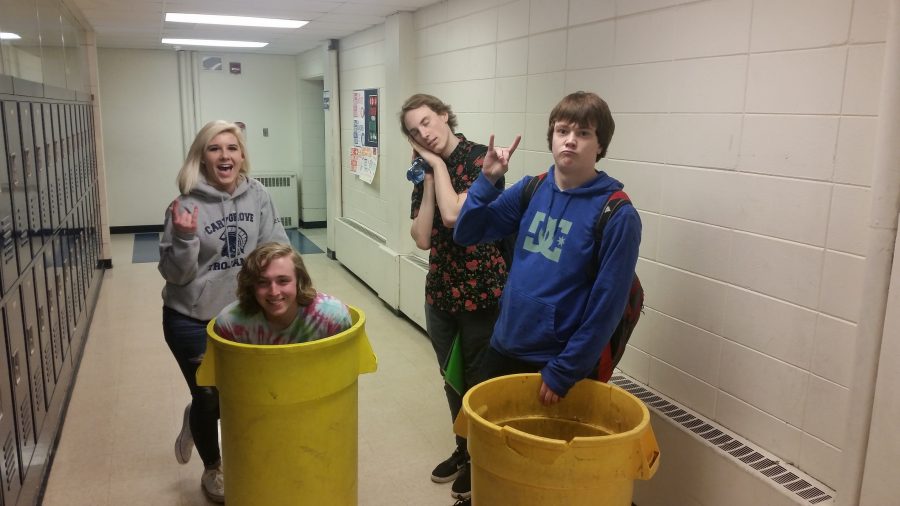Rumor has it: Does C-G actually recycle?
April 22 is Earth Day. A day where people everywhere try to be more conscious of their effect on our planet and think about environmental issues.
Here at Cary-Grove, we have signs around the school and bins in every classroom encouraging us to recycle. Environmental Science students come around every other day, collecting what we put in the bins and taking it off to be recycled.
Despite those students’ efforts, a rumor persists that we don’t actually recycle anything we collect and that it all ends up in the same bins with our trash. So what’s the truth?
“[EnviSci students] sign up…and they [collect] every Monday, Wednesday, and Friday. They have doubles on Tuesday and Thursday, so the days they don’t have doubles they sign up. Two people each day sign up and recycle. If they’re good about it, they can usually get to every classroom,” said Mr. Richards, the Environmental Science teacher.
After the students collect the recycling, they bring it “downstairs by autos,” Mr. Richards said. “There’s a big Waste Management recycling bin. They’ll throw it in there and then Waste Management will come by every three weeks and pick it up.”
After it’s out of our hands and off to the recycling company, it gets sorted. Big companies, like Waste Management, have money to sort their recycling, but not all companies are alike.
“For Waste Management, it does [get sorted],” Mr. Richards said. “Smaller companies, they really don’t because it’s pretty expensive to recycle. But [as for] Waste Management, they do have a facility in Crystal Lake and they’ll bring it and they’ll sort it”.
So, contrary to popular belief, C-G really does recycle.
“Anything that’s in the recycle bins will be picked up, put into the container downstairs, and then Waste Management will take it and separate it. Now, how much of that actually gets recycled, I don’t know,” Mr. Richards said.
As far as things that can be recycled, “usually the paper, the glass, the thick plastic, those sort of things, will be recycled,” he said. “The aluminium cans, some of the other stuff — a lot of people throw away water bottles — those things aren’t recycled”.
Things like plastic water bottle cannot be used again because they are so thin, but overall, it seems like Cary-Grove does a good job at staying environmentally conscious.
“I think here we do a pretty good job of recycling,” Mr. Richards said. “I think there’re quite a few things that don’t always get recycled, but we did a garbage and recycling audit in class a few months ago, and picked up some containers of garbage and went through it. There was very little that was actually recyclable that was in the garbage. The biggest problem is the things that are thrown in the recycling bin that aren’t recyclable. That’s just an added cost in Waste Management.”
In fact, recycling can be very expensive for the recycling companies themselves.
“That’s actually why a lot of the smaller companies will pick up your recycling, but they don’t really recycle it,” Mr. Richards said. “It’s just too much money for them to sort it. Usually Waste Management actually loses money when they do the recycling, but they’re such a big company that they can absorb that. The smaller companies, they can’t.”
As for what we can do better as a school, the one thing that Mr. Richards thinks will make the biggest impact is focusing on our water bottles.
“If more people would bring just regular, thicker plastic containers that they can refill,” that would help, he said. “The tap water is perfectly safe. We also have some of the filter stations, so if more people would do that, that would certainly be beneficial than just bringing in water bottles that can’t be reused and get thrown away.”

